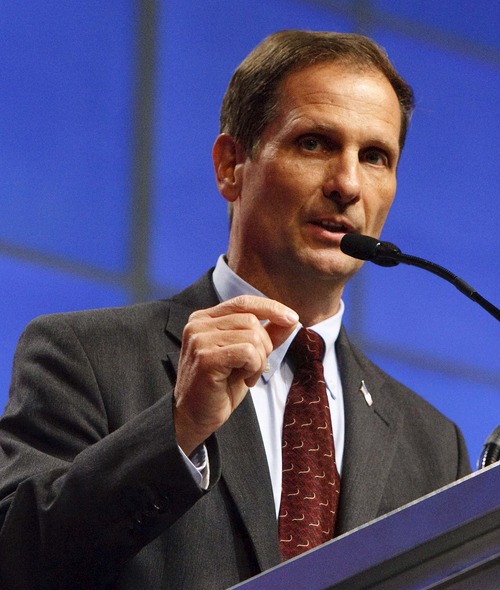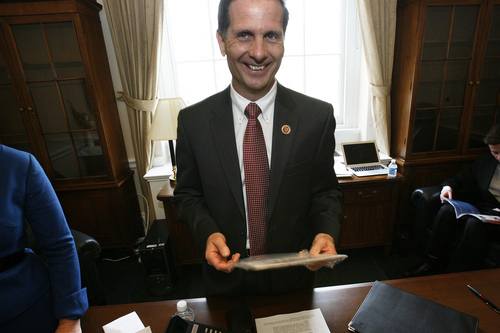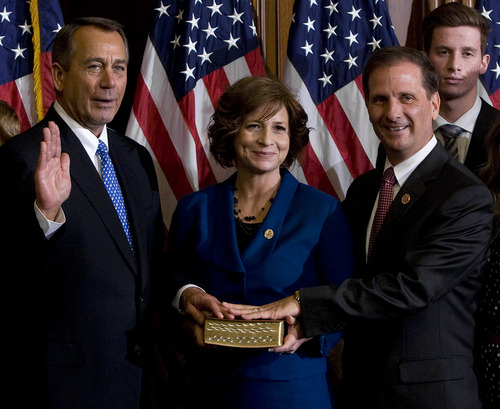This is an archived article that was published on sltrib.com in 2014, and information in the article may be outdated. It is provided only for personal research purposes and may not be reprinted.
Washington • During his first year in office, Rep. Chris Stewart rose from anonymous freshman to chairman of the subcommittee handling climate change to member of the powerful panel that controls federal spending.
Dozens of groups are now clamoring for a few minutes of his time. This increase in clout comes with an increase in his dues. That's right, members of Congress pay dues. Not to the government, but to their political parties, and the higher their position, the more they're on the hook for.
The National Republican Congressional Committee expects Stewart to contribute $190,000 by year's end, a figure based on seniority and committee assignments. The NRCC funnels the dues to Republicans in tough races in hopes of maintaining their House majority in this midterm election year. The Democrats do the same with their members.
Stewart is new to legislating and to fundraising. He hasn't given the NRCC any of his campaign money, but he has made fundraising calls on its behalf and collected about $40,000 for his party. He's been dialing for dollars for the NRCC's March dinner, its biggest event of the year.
"We are not terribly effective at it yet, in part because I'm young, and for new guys it is harder, but I'm going to pay off the dues this year," he said. "We want to help other candidates in tough races."
—
Unseemly • Linking campaign activities to committee assignments is unseemly, says Peter Schweizer, president of the conservative Government Accountability Institute and the author of "Extortion: How Politicians Extract Your Money, Buy Votes, and Line Their Own Pockets."
"We want to believe that committee assignments are based on knowledge, expertise, and background," writes Schweizer. "Raising money is what helps an ambitious member of the House rise in the ranks far more than ideas or competence."
The NRCC doesn't talk about its dues program or its link to committee assignments, but Alleigh Marré, a spokeswoman, said: "The NRCC is a member-driven organization. Our members provide the resources needed to not only strengthen the Republican majority but also stay on offense in Democrat districts."
The NRCC expects party leaders, committee bosses and members of the top panels, such as the Appropriations Committee, to have an easier time raising money. Those donations mainly come from people who have business before Congress — corporate executives, lawyers, lobbyists and professional associations.
As part of the Appropriations Committee, Stewart sits on subcommittees that oversee the departments of Interior and Health and Human Services. He should expect to see some friendly faces and, potentially, checks from insurance companies, doctors groups and energy conglomerates.
But Stewart worries that it isn't as easy as people believe. He says back in 2010, when Congress ended earmarks in which members could directly funnel money to pet projects, it made raising campaign contributions harder.
He also wants to keep his priorities in order: Represent the people of Utah's 2nd Congressional District, including Salt Lake City, take care of his own re-election bid against Democrat Luz Robles and then help House Republicans.
Stewart can turn to his House GOP colleagues from Utah for advice. Reps. Rob Bishop and Jason Chaffetz have had more time balancing their professional and party responsibilities.
—
'Team player' • "I remember when I first came to Congress, once I got here someone explained there were dues and I said, 'Excuse me, pardon me, dues?' " Chaffetz recalled. "You need to be a team player and help the team in tough races. It is painful to do; it takes a lot of time, but it is the reality of staying in the majority."
Chaffetz gave the NRCC $83,400 of his campaign contributions last year, about 20 cents of every dollar he raised. He gave $90,700 the year before that. His dues are $300,000 for the two-year campaign cycle, and he gets credit for the direct fundraising pitches he makes on behalf of the NRCC and for attending fundraisers.
Chaffetz is angling to be the next chairman of the Committee on Oversight and Government Reform, the top House watchdog over the Obama administration. Under Chairman Darrell Issa, of California, it has held investigations into the Fast and Furious gun trafficking controversy, the Benghazi attack that killed four Americans, the IRS probe of conservative groups and many others. He knows House leaders will see how much he helped the party when making that appointment.
"If you are going to seek a leadership type of position," he said, "you would be ill advised to simply ignore the dues."
Chaffetz is flying to Colorado for a fundraiser on behalf of Rep. Mike Coffman and then heading to New Hampshire for events on behalf of Frank Guinta, a former House member who is trying to make a comeback.
Bishop, who has his eyes set on heading the Natural Resources Committee, didn't want to talk about his party dues or say how much he owes. Bishop's staff did release a statement from the congressman: "I'm not preoccupied with always raising money, but I do try to make sure I have sufficient funds for my race while also trying to help the Republican team as much as possible. With Obama in the White House and Harry Reid controlling the Senate, keeping a Republican majority in the House is critical."
He gave the NRCC $28,000 in 2013, about 20 percent of everything he raised, and $96,000 in 2012, roughly 40 percent of his fundraising haul.
Bishop and Chaffetz have not faced serious competition since joining the House.
That's not been the case for Rep. Jim Matheson, the state's only Democratic member of Congress. The NRCC spent more than $1 million supporting Mia Love's attempt to unseat him in 2012, an election he won by fewer than 800 votes. Matheson, who first won in 2000, has usually found himself in tight races with lots of Republican Party money flowing to his challengers, and therefore, hasn't been expected to pay dues to the Democratic Congressional Campaign Committee.







